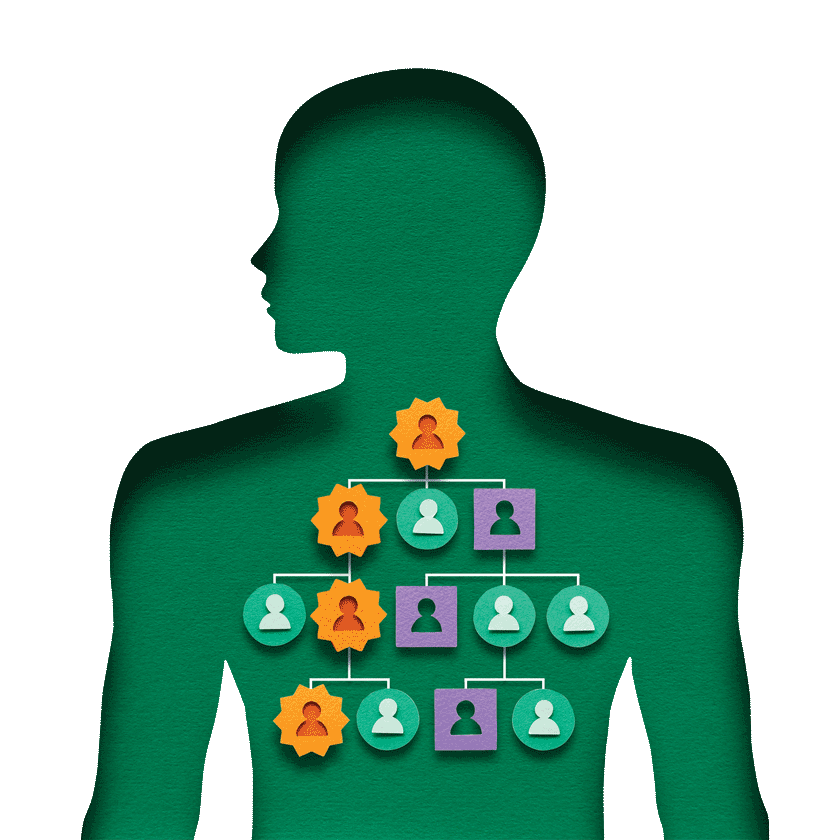For Families at Risk, Remote Education May Be Key in Improving Genetic Testing Uptake

Knowledge is power. And when it comes to a disease like pancreatic cancer, knowledge can translate into potentially better outcomes for not only the patient but their family members as well.
One way to improve the odds for family members of pancreatic cancer patients is through genetic testing and counseling. Unfortunately, many families fall through the proverbial cracks. For some it’s due to distance from a large academic medical center where testing and counseling may be more readily available. For others it’s simply through lack of knowledge.
A study called GENERATE found that remote learning may be the missing piece that improves the odds for those at highest risk of developing pancreatic cancer due to family history. “We knew that if you were going to study pancreatic cancer interception we needed to focus on the highest risk groups,” explains Sapna Syngal, M.D., M.P.H., senior author of the study. “But we also desperately needed new ways to make testing more available. We also needed new ways to bolster knowledge about how testing and counseling can make a positive difference.”
Only about five to 10 percent of all pancreatic cancers are linked to known inherited genetic variations. And studies show that cancer incidence and mortality can be reduced by identifying people who carry those variants, intervening to lower their cancer risk, and then closely monitoring these individuals to detect cancer at its earliest stages when it is most treatable. “One of the first things that needs to happen is making people aware of the importance of testing,” says Syngal, Co-Director of the Centers for Early Detection and Interception at Dana-Farber Cancer Institute, faculty member at Brigham and Women’s Hospital, and Professor of Medicine at Harvard Medical School (all in Boston, Massachusetts). “So the thought behind the study was to assess if remote genetic education programs that people could do in the privacy of their homes on their computers might affect their decision to have genetic testing.”
Indeed, genetic testing and monitoring for high-risk individuals can influence outcomes. According to a 2022 report in Journal of Clinical Oncology about the Cancer of the Pancreas Screening-5 (CAPS5) study, the study showed ‘most pancreatic cancers diagnosed within the CAPS high-risk cohort in the recent years have had stage I disease with long-term survival.’ The first step, though, remains education, emphasizes Syngal, who was one of the authors.
“People aren’t going to do anything unless we make education and genetic testing easier and more accessible,” she explains. “Access is an incredible barrier. There’s limited understanding of inherited cancer risk among the general population. And in families, there is sometimes a real lack of communication between a family member who has been diagnosed with cancer and family members who may be at risk for that cancer. There are also cost considerations like out-of-pocket costs for traveling to a large cancer center or losing wages from taking time off from work. So any barrier we can eliminate, we should try to eliminate.”
Testing the Best Approach for Education
GENERATE, which stands for GENetic Education, Risk Assessment, and TEsting, included 601 people from across 45 states who had a close relative with the most common form of pancreatic cancer, pancreatic ductal adenocarcinoma, or PDAC. Participants received genetic education through one of two remote online programs. After participating in one of the two genetic education interventions, 90 percent of the participants completed testing for inherited variations in more than a dozen genes linked to pancreatic cancer.
The study was open to people 18 years or older who had a first-degree relative with PDAC or a first- or second-degree relative (parents, siblings, aunts, uncles, cousins, grandparents, nieces and nephews, or half-siblings) with PDAC and an inherited variation in any of 13 genes linked to the disease. Participants were recruited through social media advertisements, pancreatic cancer advocacy organizations, and the six institutions collaborating on the GENERATE study.
The 601 participants, representing 424 families, were randomly assigned to one of two groups. One group participated in an interactive genetic education video session and viewed a seven-minute genetic education program narrated by a cancer physician. The other group had access only to an online genetic education program through a commercial laboratory website. Both groups had access to all materials in the online genetic education program available through the commercial laboratory website.
After completing the program, 541 participants, representing 90 percent of the entire study group, elected to undergo testing for inherited variations in PDAC-linked genes. These participants opted to receive a saliva-based genetic testing kit shipped to their homes that they would then use to send a sample by mail to a testing center.
Although the study was designed to see if remote education increased testing uptake, psychosocial measures were also evaluated. The 400 participants who completed a questionnaire on their experience indicated that testing did not spark anxiety, depression, or worries about cancer after receiving their genetic testing results.
One of the most encouraging aspects of the study is the geographic range of the participants, researchers said. More than half of all those who enrolled in the study were not family members of patients at the six study sites, suggesting they heard about the study through social media or advocacy organizations.
Furthering Reach
Unlike many studies, GENERATE met its target enrollment despite being conducted during the COVID-19 pandemic. Despite that good news, the patient population recruited was mostly white, with low numbers of Black, Asian, Pacific Islander or Latino participants. The research team developed a new study called REGENERATE, aimed at these populations. Its goal is to determine the best way to reach these community members by assessing everything from internet availability and literacy to gaining a better understanding of medical mistrust, among other barriers. Let’s Win has covered REGENERATE.
Another potential strategy currently under development by the team to spread the word about genetic testing’s importance is to train patient navigators working with patient advocacy groups. “These individuals already do an incredible job in helping people better understand treatments and clinical trials and have a strong relationship with patients,” Syngal says. “It would make sense for them to potentially include information about how family members may also be at risk and they can help guide that process of testing.
“Pancreatic cancer is just such a difficult disease, and people have shown they are absolutely open to not only learning about risk but actually getting tested to see if they are at risk. We need to keep refining the process to make it easier for people and remote education is one way.”






